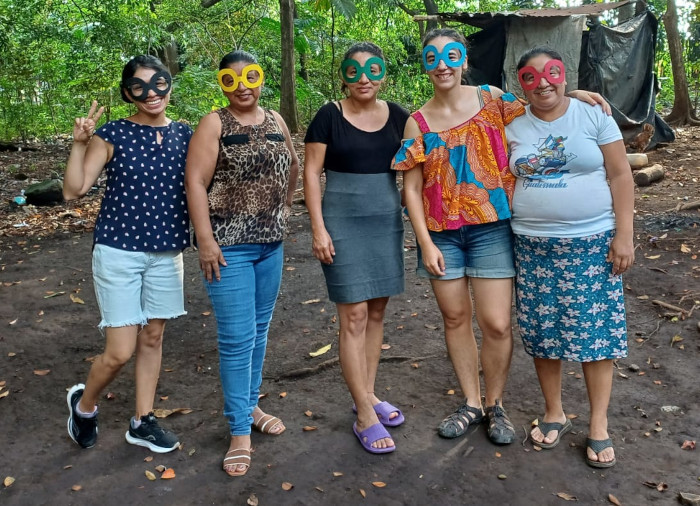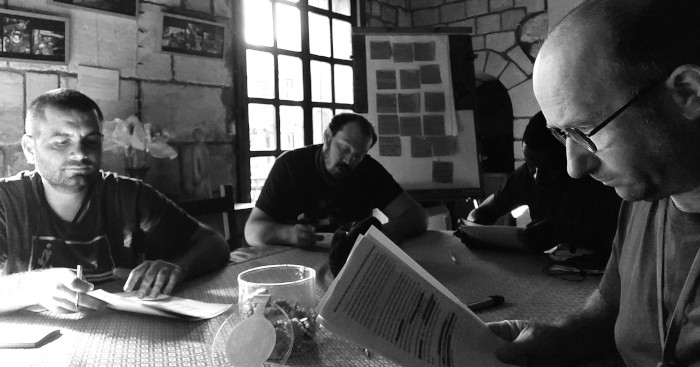Who can be a Volunteer Corps member?

Above: Marianne Marineau, second on the right
![]() Reading time 4 minutes
Reading time 4 minutes
ATD Fourth World was founded through the determination of Joseph Wresinski and the first volunteers who joined him. In 1958 that meant a group of people spurred by a “desire” to take action.
However, not everyone was able to sustain this lifestyle without some form of revenue. Wresinski quickly realized that for people living in poverty, each departure was painfully experienced as one more abandonment in the lives of those already thrust into the throes of extreme poverty. He felt that we needed people who would be able to volunteer on a “permanent basis”. Little by little, ATD Fourth World began exploring ways to compensate volunteers, enabling them to continue volunteering. But being “salaried” isn’t enough to describe all that we are as “volunteers”.
In fact, I’m playing with the meaning of the term “volunteer”. The bottom line is that to join ATD Fourth World, what counts is being in tune with the spirit of volunteering. It means taking on responsibility, and it also means having freedom — the freedom to become a Volunteer Corps member and the freedom to leave. We don’t expect everyone to join the Volunteer Corps, given the demands associated with it; it is also possible to be an ATD Fourth World Ally or Activist.
Among the Volunteer Corps members, there are people from diverse backgrounds. For example, I myself work on construction projects, but I majored in literature at university. There are doctors, artists, community organizers, engineers, teachers, occupational therapists […]; some with secondary schooling, others with specialized technical training. So, as you can see, there is room for everyone.
As Joseph Wresinski said, “To put an end to extreme poverty, everyone is needed.”
Daniel Marineau,
Volunteer Corps member

It’s not a job
When I started working at ATD Fourth World, I was basically just feeling things out. I had embarked on this journey with the ambitions and dreams of other ATD Fourth World members, and I told myself, ‘This year I’ll be a member of the Volunteer Corps, and then I’ll go on and do something else.’ The second year, I thought, ‘With all that I’ve learned now, I’d like to be able to put it into practice.’ In the third year I realized, ‘With ATD Fourth World, I’ll be able to travel.’ During my fourth year I went to Guatemala, where I observed, listened, and learned. Now, in my fifth year, I’ve realized how something that was supposed to last only a year, has turned into five.
Now that my fifth year with ATD Fourth World is drawing to a close, I can hardly imagine not continuing my commitment to our cause. Who would have guessed that ATD Fourth Word would turn out to be the ideal job: one that caters to my mental well-being, one where I earn a salary, and one that offers me opportunities to work abroad. All that would count as employment advantages for any job whatsoever, but this isn’t a job. It is a living commitment to a cause that corresponds to an ideal. An ideal that lies at the heart of what it is to be human; an opportunity to be part of a team guided by horizontal authority, open to the potential of everyone. With its fluid approach to time, it offers training opportunities and a spirit of appreciation for new encounters and quality friendships.
But more than anything, it is a choice: I have chosen to take the path of poverty in order to change society. I stand in solidarity with people living in extreme poverty. I stand with people in their struggle to assert themselves, enabling them to say, “I am not of stone, I am human.” [Or as one woman shared with me:] “If I had the leisure to spend my time dreaming, there would be no food on the table. Instead, I deal with worrisome preoccupations so that my children can dream.”
My commitment to this cause stems from my love for theatre, literature, and creativity. With time, energy and financial compensation, I have been able to gather living proof that daily suffering does not mean that self-affirmation is not possible.
If I were to sum up my job as being a support worker, it would be an oversimplification, reducing it to an activity without considering its impact — the encouragement of self-expression, the freeing of people from feelings of guilt, and bringing about collective change.
Marianne Marineau,
Volunteer Corps member
Extract from the July 2025 newsletter of ATD Fourth World Canada

